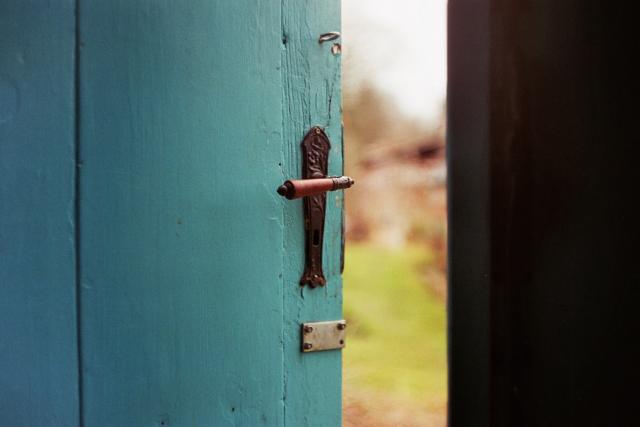
When I visited Friends in Vassalboro, Maine last month, I was blessed to have dinner with Paul and Elizabeth Cates at their home on the family's flower farm just down the road from the Vassalboro meetinghouse. We had seen each other briefly at the Living Faith gathering at the Friends School of Portland a week before, and it was wonderful to have more time with them.
Over dinner, our conversation turned to the climate surrounding the recent presidential election, about Elizabeth's life in Germany in the shadow of authoritarianism, and the fears so many who knew fascism first-hand have been feeling in recent months. Her family was part of the Confessing Church, the Christian movement in opposition to fascism; Paul and Elizabeth first met as he carried messages between East and West Berlin after the war, connecting the churches in that divided city.
I shared my sense, strengthened in prayer, that this is a time that calls for Friends to speak clearly, now more than ever.
"To speak, yes", she said. "And—to help."
In worship in the Vassalboro meetinghouse, just up the hill from the edge of China Lake, bounded by the beautiful burial ground where so many generations of Friends are laid to rest, I felt the close presence of New England Friend Rufus Jones, whose ministry and tireless service reshaped the Quaker movement in the early twentieth century. There, praying on the shores of the lake where Rufus grew up, I was drawn to remember a story Rufus told—a story I grew up with—about a delegation of American Friends sent to Germany to seek Nazi permission to provide aid and safe passage for Jews being persecuted under fascism.
The story goes that in the days following Kristallnacht—the "Night of Broken Glass"—when hundreds of Jews were killed, thousands were arrested, and thousands of Jewish homes, businesses and synagogues were destroyed on November 9-10, 1938, the American Friends Service Committee asked Rufus and two other Friends to travel to Germany to see what American Quakers could do in the face of such violence and suffering.
Their mission led them to petition the Gestapo—the Nazi secret police—directly. After they had presented their initial request, they were asked to wait for a decision. There in a small room deep in the headquarters of the fearsome secret police in Berlin, they entered into a time of silent, waiting worship.
After who knows how long, they were told that the permission they were seeking had been granted; they would be able to work (for the time being) for the relief and safe passage of Jews who were suffering so greatly in Germany.
Since I visited Vassalboro, in daily prayer and in worship in meeting, I've found my thoughts turning again to that worship, there on the threshold of the Gestapo. I've wondered: In the midst of such fear, in the heart of such institutional evil, surrounded by worldly power, what assurance might they have felt in that worship? What was their experience, waiting there in the stillness, on the threshold of fascism? Where did they find the courage to make room for worship together at such a time, in such a place? What risk of faith must it have taken, in the face of all the voices and pressures telling them that "power" came through violence, oppression and fear, to again entrust their lives to the motion of Love?
Imagining those moments of worship, the witness of Friends in that generation, and the Love that flowed through them, I find myself amazed. And I've come to realize that's exactly where I need to be.
Thomas Merton, in an essay in his "Raids on the Unspeakable", reminds us that in the story of Christmas, the Christ-child is born when there is no space available—in a "time of no room," a time such as this. The radical discipline of Advent, this season when so many of our wider Christian siblings celebrate the preparation for the coming birth of Jesus, is a time of waiting, of absence, of preparing room in our hearts and in our lives for the inbreaking of new Life and Light in the midst of the darkness of the winter, in the midst of the suffering, fear, anxiety, busyness, distraction, division, rage and hopelessness of our world.
In the Christmas story, when this Life and Light come through, there is amazement. Suddenly, everything is seen in its true perspective, and the forces of death and empire lose their dominion over our hearts.
It just may be that the challenge for our faith today is fundamentally the same as the one before those Friends in Berlin in 1938. We stand on the threshold of a new year, on the threshold of a new presidency, in a time when so much is passing away, when the institutions of church, economy and society that once seemed eternal are profoundly changed or breaking down, when the present terrors of white supremacy, authoritarianism and ecological collapse are deeply felt.
Though fear and uncertainty surround us, though we can't predict tomorrow, though for so many of us looking into the future feels like staring into the abyss, I believe we are invited—challenged—to walk in fearsome places in simple obedience to the tender, unshakeable Love of God, and to make room for amazement. Our Friends practices and our meeting communities can help us to open ourselves to the Power we can encounter in worship together, the Love and Life of God, the quickening Spirit that waits to be born anew today—in our own hearts, in us as a faith community, and in our world.
In the risk of faith,
Noah Merrill
Secretary
New England Yearly Meeting of Friends